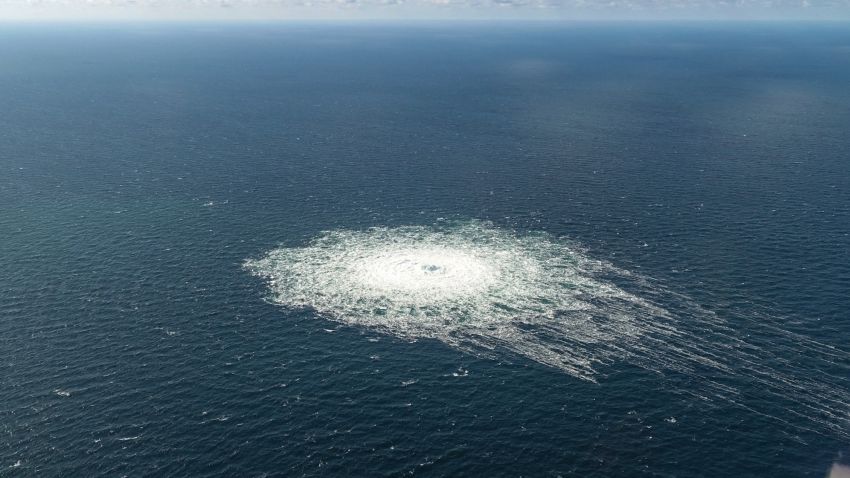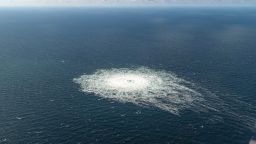The US is considering offering to use its most advanced underwater sound reading capabilities to analyze audio recordings from around the time of the Nord Stream gas pipelines’ apparent sabotage, according to two sources familiar with the matter.
The US Navy’s processing of the sonar signatures – the term for the unique underwater sounds – provided by Sweden and Denmark could boost the investigations by providing a more detailed picture of what was in the area at the time of the pipeline explosions and what caused them, sources said. While many countries have the capability to process underwater sounds, the US has the most advanced system, sources said.
The processing of the underwater sound is viewed as a key piece of the investigation in addition to what underwater investigators find, sources said. Officials have said satellite images from the days before the leaks are unlikely to prove helpful because it was cloudy.
But the degree to which the US assistance on processing the underwater recordings could be helpful will depend on the quality of the recordings. The quality of any recordings that the Swedes and Danes have is unclear, sources said.
Each type of underwater machinery like submarines, torpedoes and vessel engines makes a unique sound that is called a “sonar signature,” and the US has an extensive library of these sounds.
A Navy spokesperson would not confirm the US is offering to analyze the sonar recordings but said the Navy is was ready to help the investigations.
“We are aware of reports concerning leaks to the Nord Stream pipelines. We stand ready to provide support and assistance in close coordination with our allies and partners, if needed,” Capt. Tamara Lawrence said.
The Swedish National Seismic Network (SNSN) said they had detected the explosions and experts said that the SNSN could share recordings with the US for processing, but seismic recordings are not the same as high quality sonar recordings.
“What they are looking for is known signatures of adversaries class of ships or known signatures associated with an act like opening a torpedo door. The goal is to determine what caused this. The quality of the data and the kind of historical data in the database will determine to what degree they can accurately attribute this event using sonar signatures,” explained Mark Montgomery, the senior director of the Center on Cyber and Technology Innovation at the Foundation for Defense of Democracies.
The US has helped to analyze underwater recordings from the Swedes in the past, experts said.
These conversations about providing that assistance now come as the US Defense Department is doing “prudent planning” to see what assets, equipment and technical expertise that the US has available to assist Baltic nations with the investigations, CNN reported last week.
The Swedish military has sent multiple ships to the area around the incident to support the Swedish coast guard’s investigation, Philip Simon, a spokesperson for the Swedish Armed Forces, told CNN. At least one of those ships, a submarine rescue vessel named the HMS Belos, is capable of capturing high-quality underwater recordings, Simon said. Those recordings could prove useful to investigators, but it’s unclear what kind of recordings they have from around the time of the sabotage. Simon said the HMS Belos arrived on the scene of the pipeline leaks over the weekend.
“The use of acoustics and sonar technology will be very important here. It’s forensic evidence. It is like getting a sonogram from a doctor,” explained Joseph Mazzafro, a defense contractor and retired Navy captain. “The US has the best sensors in the world to detect sound and pick meaningful information out of the noise in the water. And we have people that understand the science of acoustics because the US has been doing this since the 1940s. they know what submarines sound like, underwater drilling all of that. Then you add to that considerable computing power and AI intelligence.”
The Swedish police were initially investigating the incident but the Swedish security service, whose mandate includes national security matters, took over the investigation last week, according to Nina Odermalm Schei, spokesperson for the service.
That handover, from criminal to national security investigation, occurs when it can’t be ruled out that one or more foreign powers is involved in a security incident, Schei told CNN by phone from Sweden.
The explosions that caused the leaks of the Nord Stream pipelines are a “really complex” and “serious crime,” Schei said, adding that the investigation could take time to run its course. She declined to comment on who might be behind the explosions.
Swedish Coast Guard spokesperson Mattias Lindholm said the Swedish ships available to assist the investigation are technologically sophisticated but declined to go into detail.
“We have the capabilities that are of interest to the prosecutor to move the investigation forward,” Lindholm said.
The investigation comes as the Biden administration is also looking to guard against any future attacks on critical infrastructure. The US is coordinating with allies to increase surveillance and monitoring of energy infrastructure, including pipelines in the Baltic Sea.
“The United States has capabilities to be able to bring to bear, and we are bringing those to bear,” said national security adviser Jake Sullivan on Friday.
This story has been updated with additional details.


